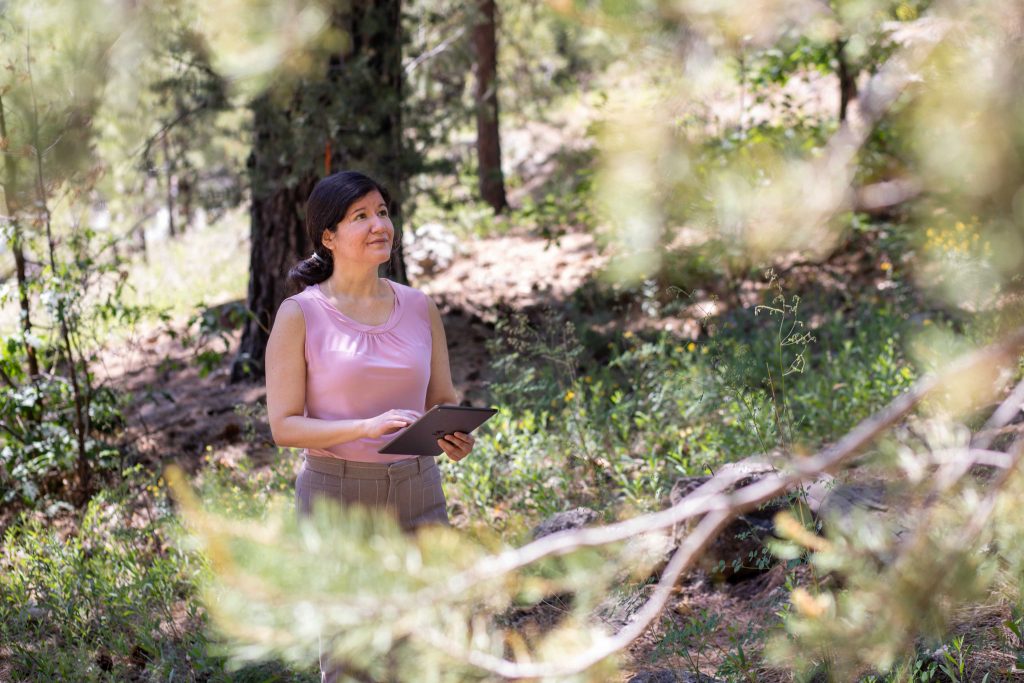The Douglas fir is one of the most economically important timber trees in the U.S. Harvested for the strength of its wood in a wide variety of uses, especially in fencing, home construction and decking, it’s considered the backbone of the western timber industry. But warming temperatures and more severe and frequent heat events are posing significant challenges to the survival of the Douglas fir and other commercial tree species—contributing to fewer resources, supply chain problems and, ultimately, higher prices for lumber.
By applying genomics (studying the species’ complete set of DNA) to develop a deeper understanding of how the Douglas fir and other slow-growing tree species respond to and tolerate drought—and how hybridization can help these species adapt to climate change—scientists believe they can better manage forest productivity over the next 50 to 100 years.
Assistant professor Amanda De La Torre of Northern Arizona University’s School of Forestry was recently awarded $1.2 million by the National Science Foundation’s prestigious Faculty Early Career Development (CAREER) Program for a five-year study entitled “Temporal and Transgenerational Genomic and Epigenetic Effects of Hybridization in Long-generation Tree Species.”
This CAREER grant, the highest amount ever awarded to NAU faculty since the creation of the program in 1995, is the first awarded to faculty in the School of Forestry, the third to faculty in the College of the Environment, Forestry, and Natural Sciences (CEFNS) and the eighth CAREER grant awarded to NAU faculty overall. The NSF program supports “early-career faculty who have the potential to serve as academic role models in research and education and to lead advances in the mission of their department or organization. Activities pursued by early-career faculty should build a firm foundation for a lifetime of leadership in integrating education and research.”
“Douglas fir is one of my favorite trees and an exciting species to study due to its wide distribution, wide ecological niche, evolution and resilience to changes in the climate such as drought and cold,” De La Torre said. “I got interested in hybridization of long-lived forest trees when I was doing my Ph.D. thesis at the University of British Columbia in Vancouver, where I investigated the hybridization between spruces along an elevational gradient. I started working on Douglas fir genomics six years ago, when I was working as a postdoc researcher at the University of California-Davis.”
The project represents a combination of research topics De La Torre investigates in her lab, including hybridization, drought tolerance, climate adaptation and the epigenomics of trees. The outcomes of her research will be the first of their kind for a conifer species and will significantly contribute to our understanding of the genomic and epigenomic basis of phenotypic variation in long-generation tree species. The role of hybridization in adaptation to changing climates in Douglas fir and other conifers has been poorly studied, so this study will also make important contributions to that area.
Award to support undergraduate and graduate student training
The project also has a significant student component, supporting the work of approximately 12 undergraduates in addition to a grad student and a postdoctoral researcher. Students will be trained in molecular lab techniques, greenhouse work and bioinformatic analyses through internships, course modules and summer workshops, and they will be encouraged to share what they learn through outreach activities at science expositions at K-12 schools and public scientific events in the community.
“NSF CAREER awards are an outstanding mark of distinction and a tremendous enabler of the research careers of our young faculty,” Vice President for Research and CEFNS Dean Jason Wilder said. “I’m so proud that Dr. De La Torre has been awarded this grant for her work in forest genetics and epigenetics. Amanda is a true teacher-scholar who contributes significantly to both lower- and upper-division teaching in forestry and mentorship of undergrad and graduate research students while implementing her outstanding research program.”
Kerry Bennett | Office of the Vice President for Research




